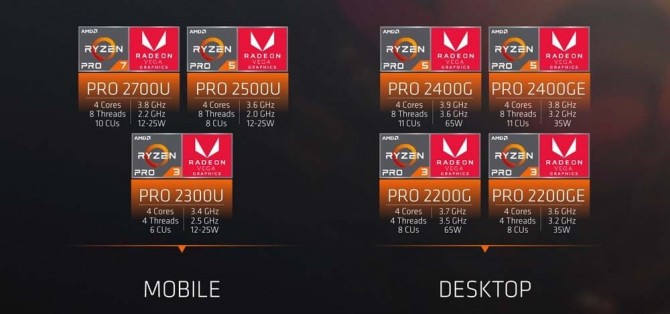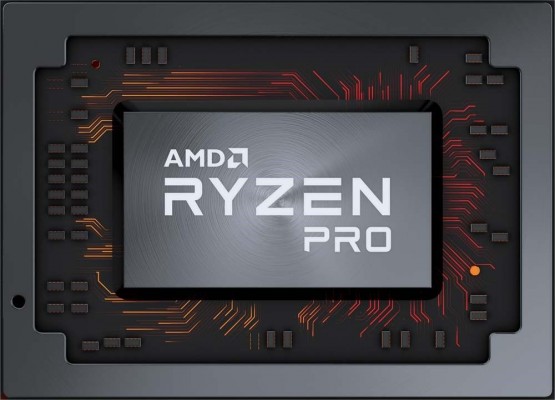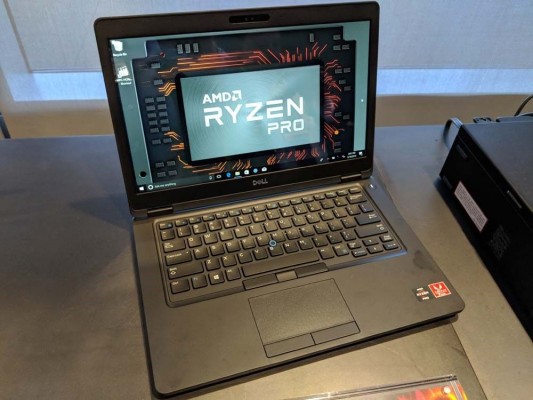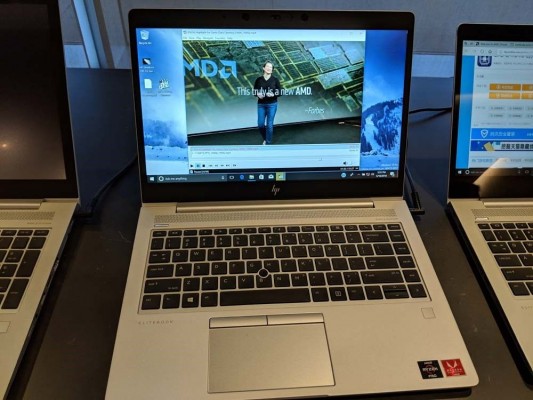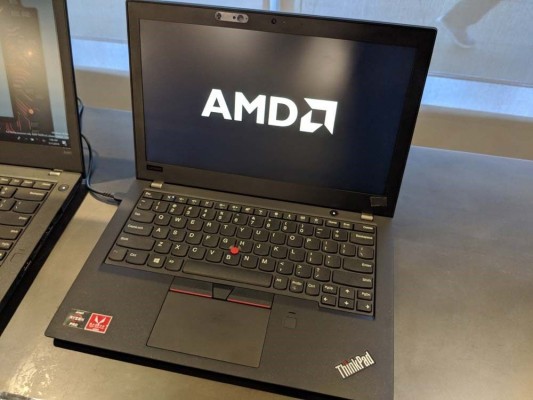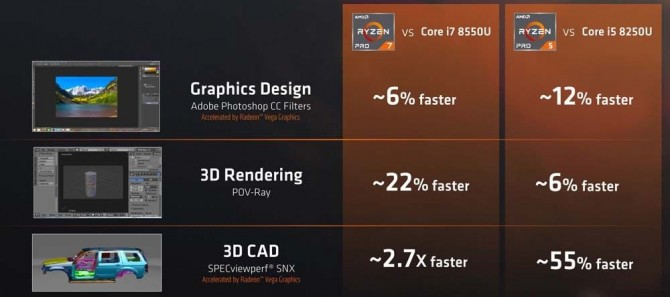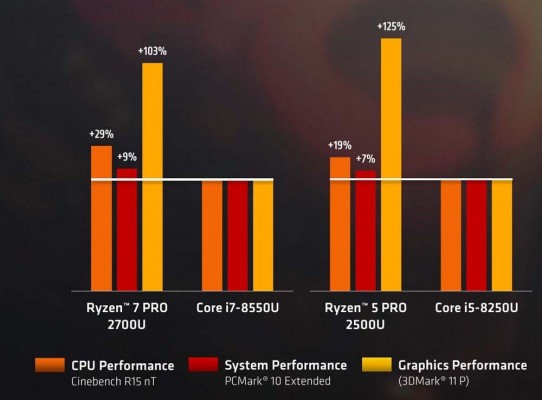AMD’s Ryzen Pro Mobile Debuts: What You Need to Know
Sign up to receive The Snapshot, a free special dispatch from Laptop Mag, in your inbox.
You are now subscribed
Your newsletter sign-up was successful
AMD dove back into the processor game last year, giving Intel some formidable competition as it introduced new Ryzen CPUS for laptops, gaming and desktops. The chipmaker now wants to do the same thing in the commercial space with a new set of Ryzen processors built for high-performance laptops used in corporate settings.
The Ryzen Pro lineup debuts today (May 14) with some serious backing. Dell, HP and Lenovo simultaneously announced new mobile offerings that run on AMD's latest chips.
Here's a rundown of what to expect from the new Ryzen Pro processors coming out of AMD.
What is AMD Ryzen Pro?
AMD has unveiled its Ryzen Pro lineup which includes Radeon Vega graphics. Four of the new accelerated processing units (APUs) — that's what AMD calls its integrated CPUs and GPUs — are built for desktops, while three will power laptops. These are the APUs AMD first told us about in January prior to CES.
These Ryzen Pro processors are designed for machines in what AMD describes as the commercial market — enterprise, government and business users who need high-performance computational power in laptops and desktops that can pull double duty for both work and home life.
MORE: The Best Laptops for Business and Productivity
Sign up to receive The Snapshot, a free special dispatch from Laptop Mag, in your inbox.
"A lot of what we wanted to do is not be shy about the fantastic features of Ryzen as it relates to developing beautiful designs, to being able to entertain people, and to do more than just getting work done," said Kevin Lensing, corporate vice president and general manager of AMD's client business unit. "Because as work and life blend ... you want to bring all the features that make people want to buy a PC in the consumer space, you want to make all that available in the commercial space as well."
Which CPUs are available and what are the specs?
The mobile 14-nanometer Ryzen Pro processors with Radeon Vega graphics fall into these three groups:
- Pro 2300U: This Ryzen Pro 3 processor has four cores, four threads and six compute units. It runs at 2.5 GHz, topping out at 3.4 GHz.
- Pro 2500U: This Ryzen Pro 5 processor also has four cores, but increases threads and compute units to eight each. It starts at 2 GHz and ramps up to 3.6 GHz.
- Pro 2700U: This Ryzen Pro 7 processor has four cores as well, with 8 threads and 10 computer units. It runs at 2.2 GHz, up to 3.8 GHz.
"It's a heavy reuse in terms of specs from our consumer lineup ... but we layer into these products all of the security and reliability assurances that you need to deliver the best possible product for the commercial market," Lensing said.
Which laptops will support Ryzen Pro?
AMD has lined up three major laptop makers — Dell, HP and Lenovo — all of whom announced products powered by the latest Ryzen Pro APUs. Dell's offering, the Latitude 5495, is a 14-inch, 3.6-pound laptop durable enough to move from meeting room to meeting room and with enough battery power to go awhile between charges.
HP announced the largest number of Ryzen Pro-powered devices, highlighted by its EliteBook 700 Series G5. Available in 13-, 14- and 15-inch models. The EliteBooks boast an ulta-bright display that adapts automatically to different kinds of ambient light. Security features include support for HP's Sure View technology that prevents other people from seeing what's on your screen when you hit the F2 key and a slidable privacy shutter to cover the integrated webcam when it's not in use.
The EliteBooks also have dedicated Skype keys for starting and ending conference calls as well as for sharing your screen. A microphone on the outer case picks up other people's voices in collaboration sessions while using noise cancellation technology when it's just you.
In addition to the EliteBook, HP also announced that its 14-inch ProBook 645 will feature a Ryzen Pro with integrated graphics, too.
Lenovo has a pair of ThinkPads powered by the new APUs. The 14-inch A485 weighs less than 3.5 pounds and offers an optional extended battery for those who need their computer to last all day. At 2.5 pounds, the 12-inch A285 is the more portable of the two ThinkPads, and Lenovo says it's 20 percent lighter and 15 percent thinner than it was before.
Who are these laptops for?
All three laptop makers are targeting the enterprise market with these Ryzen Pro models, touting security, durability and longevity features. AMD is placing particular emphasis on the security features, clearly hoping to appeal to IT departments of the commercial customers it covets.
"Security is fundamental to what we do," Lensing said. "Every AMD processor has built into it a secure hardware processor... a separate little subunit that handles all of our security instructions. We call that our secure processor. It does things like secure boot. It handles and conforms to Windows enterprise security standards and what our partners are trying to do with their own applications."
These aren't just drab utilitarian machines, though. Both AMD and the laptop makers using the Ryzen Pro chips say the notebooks are designed for people who use the same machine at home as they do at work.
"You probably don't want to go into your IT decision maker's office and the first statement in your pitch is 'This one can game,'" Lensing said. "But I guarantee you, you deploy these AMD notebooks, and your users take them home, and they realize that their commercial notebook that they got can actually play Dota 2, can play League of Legends, can play Fortnite, can play Overwatch — they're going to love it."
What kind of performance can I expect from Ryzen Pro?
AMD promises all-day battery power for the mobile Ryzen Pro chips, with a 270 percent improvement in energy efficiency over the previous generation of processors. That translates to 16 hours of battery life and 10.5 hours of video playback, according to AMD's testing.
When we had the chance to test the consumer edition of the Ryzen chips last year, they compared favorably to processors from Intel. AMD promises more of the same with the Ryzen Pro chips for commercial laptops.
The chipmaker says the Ryzen Pro 7 and Ryzen Pro 5 are neck-and-neck with Intel's Core i7 8550U and Core i5 8250U, respectively, when it comes to light workloads, which AMD defines as Office 2016 tasks, file compression and basic Photoshop filters. For more processor-intensive tasks — graphics design, 3D rendering and 3D CAD — AMD says its chips outperform their Intel counterparts.
Are these the only Ryzen processors AMD has unveiled?
In addition to these mobile APUs, AMD also unveiled four desktop processors aimed at commercial workstations and mini PCs. The Ryzen Pro desktop lineup includes a pair of Ryzen 3 and Ryzen 5 processors with Radeon Vega graphics.
- Pro 2200G: 4 cores, 4 threads, 8 compute units; 3.5GHz up to 3.7GHz
- Pro 220GE: 4 cores, 4 threads, 8 compute units; 3.2Ghz up to 3.6GHz
- Pro 2400G: 4 cores, 8 threads, 11 compute units; 3.6GHz to 3.9GHz
- Pro 2400GE: 4 cores, 8 threads, 11 compute units; 3.2GHz to 3.8GHz
What can I expect from AMD next?
AMD plans to release more Ryzen products this year than it did in 2017. That's an ambitious goal, considering the company rolled out 20 Ryzen offerings last year.
In the near term, second-generation Ryzen Pro processors for commercial desktops are on track to arrive in the second half of this year, and the second-generation Ryzen Threadripper will as well. That's currently being sampled to key customers, based on a 12-nanometer processor technology, AMD says.
AMD's current crop of Ryzen products use the Zen microarchitecture. Design is complete on the next-generation Zen 2 microarchitecture, according to AMD.
